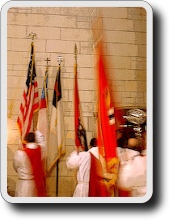Choice and State Law
09/2018 Church & State Issues

SACE supports a manner of “separation of Church and State,” but believe an accurate reading of church-state concerns supports lightly regulated religious school choice. Our reasoning is that education is religious by nature! Here are some of our thoughts -
Post a comment about: "How the First Amendment effects or should effect how the public supports education."
- They believe that the First Amendment’s religion clauses prohibit public schools from supporting any religious view.
- They believe that local public schools should support Christian beliefs and practices since America is predominantly Christian and has so many Christian roots.
- They avoid the philosophic discussion and support secular schools as an opportunity to be “salt and light”.
- They avoid the philosophic discussion and hope their children learn enough at school to get a good job.
Addressing the last first, perhaps most Americans fall into this category – a result I believe can be attributed to a philosophic shallowness that has resulted from four generations of secular schooling.
However, those in the first category reflect America’s historical concern that the rights of conscience not be violated. Contrary to the headline making atheist, these people tend to acknowledge not a hatred for Christianity or religion in general, but a concern that government entities not “force” a particular view of Truth on others. Historically, America has utilized a paradigm of “separation” to describe the proper relation of church and state. However, in the realm of public education, separation assumes that the goals of public education are in no ways religious. This is false.
The Good in Church-State Separation
Those in the second group appeal to America’s early historical record that acknowledged the important place of Protestant Christianity in society. They also (rightly) see how secular ideology drove religion from many of its former places in society. However, they neglect not only the concerns of conscience of minority religious communities, but they fail to consider the negative effects on faith that a “pro-Christian” curriculum would have when taught by non-believers.
Though the third group remains aloof from the philosophic discussion, it is important because it effectively removes many concerned people of faith from opposing the “secular only” public education model. This group tends to overlook not only the evangelistic opportunities inherent within every religious school, but they fail to see the ways in which a secular education diminishes the intellectual preparation of their children.
If the above perspectives are narrow, how do I conceive a broader discussion? Each group brings valid concerns to the table. Public employees should not teach our children “all that is true”, yet since one’s religious beliefs speak to every aspect of life, secular education is inadequate if it makes any attempt to be thorough. School choice is opening the door to redefine the view of public’s education, yet charter schools and magnet schools that receive direct government funding are just as bound by First Amendment restrictions to remain secular due to concerns of conscience. The church-state problem is inherent within our current paradigm of public education. A new paradigm must be established in which public education is viewed as a narrow body of concerns (such as basic reading, writing, mathematics, and civics skills) that may be achieved within schools of diverse religious views.
Joint Venture Schools
If we define a public school as any school willing to supports the public’s educational concerns, and if we provide a path of indirect funding to ensure that religious school personnel are not government employees, then “public education” can be offered within a variety of philosophic (religious) perspectives. A light system of regulation and accountability could be implemented to insure public money was not expended negligently in what I call “Joint Venture” schools. These are schools that would be publicly accredited, privately operated, and indirectly publicly funded. Only this model of public education meets both the concerns of conscience and the concerns of the public.
The above model is consistent with the evolution of church-state law and philosophy in America. Secular public schooling was birthed by modernity’s world view that displaced the educational prominence of religious perspectives with a reason based “scientific” perspectives. It was o.k. to separate religion from education because it was believed reason alone provided an adequate foundation for learning and moral development. Not only has further experience challenged this assumption, but the Supreme Court has largely abandoned the paradigm of “strict separation” in favor of a more neutral inclusion. Whereas under separation, no religious symbols could be displayed could be displayed in school; now religious symbols can be displayed as long as the context makes it clear that one is not being advocated by the state. Schooling is a similar scenario; church state concerns are fulfilled if the choice of a religious school is made by private individuals. See Zelman vs Simmons-Harris.
A balanced and informed understanding of both church-state philosophy and First Amendment law supports the redefinition and reconfiguration of public education in a manner that allows parents to choose the philosophy within which their child’s “public education” is enshrouded.
Society for the Advancement of Christian Education
blog comments powered by Disqus
